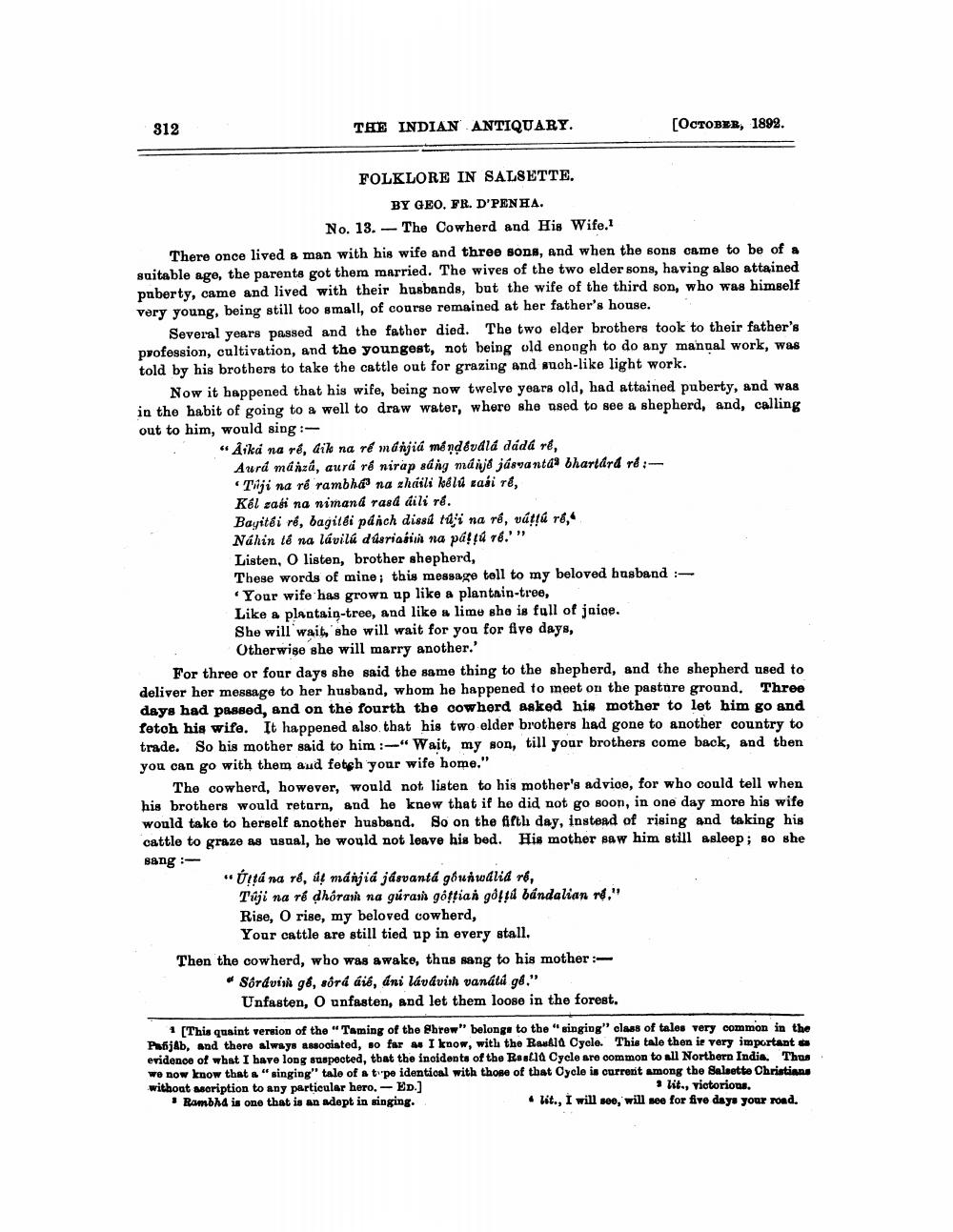________________
312
THE INDIAN ANTIQUARY.
[OCTOBER, 1892.
FOLKLORE IN SALSETTE.
BY GEO. FR. D'PENHA.
No. 13. - The Cowherd and His Wife. There once lived a man with his wife and three sons, and when the sons came to be of a suitable age, the parents got them married. The wives of the two elder sons, having also attained puberty, came and lived with their husbands, but the wife of the third son, who was himself very young, being still too small, of course remained at her father's house.
Several years passed and the father died. The two elder brothers took to their father's profession, cultivation, and the youngest, not being old enough to do any manual work, was told by his brothers to take the cattle out for grazing and such-like light work.
Now it happened that his wife, being now twelve years old, had attained puberty, and was in the habit of going to a well to draw water, where she used to see a shepherd, and, calling out to him, would sing :
"Aika na rê, dik na ré mánjia me nd&vdlá dádá rë, Aurá má inza, aura ré nirap súng mája jásvantaa bharlard rd:
Thiji na re rambh na zhdili kélú casi te, Kél sabi na wimana rasd dili re. Bayitki ré, bagitli pdich dissa tu i na rá, vátra re, Náhin te na lávilú dúsriasi na pátú .'" Listen, O listen, brother shepherd, These words of mine; this message tell to my beloved husband :*Your wife has grown up like a plantain-tree, Like a plantain-tree, and like a lime she is full of juice. She will wait, she will wait for you for five days,
Otherwise she will marry another.' For three or four days she said the same thing to the shepherd, and the shepherd used to deliver her message to her husband, whom he happened to meet on the pastore ground. Three days had passed, and on the fourth the cowherd asked his mother to let him go and fetoh his wife. It happened also that his two elder brothers had gone to another country to trade. So his mother said to him :-"Wait, my son, till your brothers come back, and then you can go with them aud fetgh your wife home."
The cowherd, however, would not listen to his mother's advice, for who could tell when his brothers would return, and he knew that if he did not go soon, in one day more his wife would take to herself another husband. So on the fifth day, instead of rising and taking his cattle to graze as usual, he would not leave his bed. His mother saw him still asleep; so she Bang :
Úttá na rd, de mánjia jásvantá go niwlid ne, Táji na ró dhórani na gúrasi goffian gold bándalian nd." Rise, O rise, my beloved cowherd,
Your cattle are still tied up in every stall. Then the cowherd, who was awake, thus sang to his mother:
* Sordvih ge, sorá áié, ani láudvirh vanátá g8."
Unfasten, O unfasten, and let them loose in the forest.
[This quaint version of the "Taming of the Shrew" belonge to the "singing" class of tales very common in the Panjab, and there always associated, so far w I know, with the Rauld Cycle. This tale then is very important evidence of what I have long suspected, that the incidents of the Raulid Cycle are common to all Northern India. Thus we now know that a "singing" tale of a t'pe identical with those of that Cycle is current among the Salsette Christians without scription to any particular hero. -ED.]
. lit., victorious. Rambhd is one that is an adept in singing.
• lit., I will see, will see for five day your rond.




